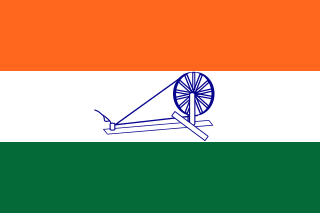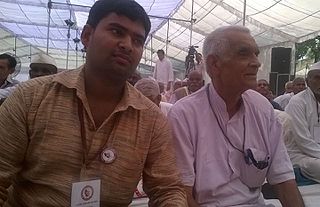
Mohandas Karamchand Gandhi was an Indian lawyer, anti-colonial nationalist and political ethicist famous for his nonviolent resistance. He lead the successful campaign for India's independence from British rule, and later inspired movements for civil rights and freedom across the world. The honorific Mahātmā, first applied to him in 1914 in South Africa, is now used throughout the world.

Atal Bihari Vajpayee was an Indian politician who served three terms as the 10th Prime Minister of India, first for a term of 13 days in 1996, then for a period of 13 months from 1998 to 1999, followed by a full term from 1999 to 2004. Vajpayee was one of the co-founders and a senior leader of the Bharatiya Janata Party (BJP). He was a member of the Rashtriya Swayamsevak Sangh, a Hindu nationalist volunteer organisation. He was the first Indian prime minister not of the Indian National Congress to serve a full term in office. He was also a renowned poet and a writer.

Lal Krishna Advani is an Indian politician who served as the 7th Deputy Prime Minister of India from 2002 to 2004. Advani is one of the co-founders and a senior leader of the Bharatiya Janata Party. He is a long time member of the Rashtriya Swayamsevak Sangh, a volunteer organisation. He also served as Minister of Home Affairs in the BJP-led National Democratic Alliance government from 1998 to 2004. He was the Leader of the Opposition in the 10th Lok Sabha and 14th Lok Sabha and also the longest serving person of this post. He is widely considered architect of Hindutva politics and was the power centre of BJP in 1990s. He was the Prime Ministerial candidate of BJP in 2009.

The Non-cooperation movement was a political campaign launched on 1 September 1920, by Mahatma Gandhi to have Indians revoke their cooperation from the British government, with the aim of persuading them to grant self-governance.
Sarvōdaya is a Sanskrit term which generally means "universal uplift" or "progress of all". The term was used by Mahatma Gandhi as the title of his 1908 translation of John Ruskin's critique of political economy, Unto This Last, and Gandhi came to use the term for the ideal of his own political philosophy. Later Gandhians, like the Indian nonviolence activist Vinoba Bhave, embraced the term as a name for the social movement in post-independence India which strove to ensure that self-determination and equality reached all strata of Indian society. Samantabhadra, an illustrious Digambara monk, as early as the 2nd century A.D., called the tīrtha of Mahāvīra by the name sarvodaya.

Swarāj can mean generally self-governance or "self-rule". It was first used by Chhatrapati Shivaji Maharaj to attain self rule from the Mughal Empire and the Adil Shahi and Nizam Shahi Sultanates. Later, the term was used synonymously with "home-rule" by Maharishi Dayanand Saraswati and later on by Mahatma Gandhi, but the word usually refers to Gandhi's concept of Indian independence from foreign domination. Swaraj lays stress on governance, not by a hierarchical government, but by self-governance through individuals and community building. The focus is on political decentralisation. Since this is against the political and social systems followed by Britain, Gandhi's concept of Swaraj advocated India's discarding British political, economic, bureaucratic, legal, military, and educational institutions. S. Satyamurti, Chittaranjan Das and Motilal Nehru were among a contrasting group of Swarajists who laid the foundation for parliamentary democracy in India.

Gandhism is a body of ideas that describes the inspiration, vision, and the life work of M.K. Gandhi. It is particularly associated with his contributions to the idea of nonviolent resistance, sometimes also called civil resistance.

Madeleine Slade, also known as Mirabehn or Meera Behn, was a British supporter of the Indian Independence Movement who in the 1920s left her home in England to live and work with Mahatma Gandhi. She devoted her life to human development and the advancement of Gandhi's principles.
Narhari Dwarkadas Parikh was a writer, independence activist and social reformer from Gujarat, India. Influenced by Mahatma Gandhi, he was associated with Gandhian institutes throughout his life. He wrote biographies, edited works by associates and translated some works. His writing also reflected Gandhian influence.

The Declaration of Purna Swaraj was a resolution which was passed because of the dissatisfaction among the Indian masses regarding the British offer of Dominion status to India. The word Purna Swaraj was derived from Sanskrit पूर्ण (Pūrṇa) 'Complete', and स्वराज 'Self-rule or Sovereignty', or Declaration of the Independence of India, it was promulgated by the Indian National Congress, resolving the Congress and Indian nationalists to fight for Purna Swaraj, or complete self-rule/total independence from the British rule

Integral humanism was a set of concepts drafted by Deendayal Upadhyaya as a political program and adopted in 1965 as the official doctrine of the Jan Sangh and later BJP. Upadhyaya borrowed the Gandhian principles such as sarvodaya, swadeshi (domestic), and Gram Swaraj and these principles were appropriated selectively to give more importance to cultural-national values. These values were based on an individual's undisputed subservience to nation as a corporate entity.

Umashankar Jethalal Joshi was an Indian poet, scholar and writer known for his contributions to Gujarati literature. He wrote most of his works in Gujarati.
Gandhian economics is a school of economic thought based on the spiritual and socio-economic principles expounded by Indian leader Mahatma Gandhi. It is largely characterised by rejection of the concept of the human being as a rational actor always seeking to maximize material self-interest that underlies classical economic thinking. Where Western economic systems were based on what he called the “multiplication of wants,” Gandhi felt that this was both unsustainable and devastating to the human spirit. His model, by contrast, aimed at the fulfillment of needs – including the need for meaning and community. As a school of economics the resulting model contained elements of protectionism, nationalism, adherence to the principles and objectives of nonviolence and a rejection of class war in favor of socio-economic harmony. Gandhi's economic ideas also aim to promote spiritual development and harmony with a rejection of materialism. The term "Gandhian economics" was coined by J. C. Kumarappa, a close supporter of Gandhi.

J. C. Kumarappa was an Indian economist and a close associate of Mahatma Gandhi. A pioneer of rural economic development theories, Kumarappa is credited for developing economic theories based on Gandhism – a school of economic thought he coined "Gandhian economics."
The Aundh Experiment was an early test of village-level self-government in British India which began in 1938 in Aundh State in present-day Maharashtra. Mohandas Gandhi, and Maurice Frydman helped to draft the November Declaration, which handed over rule of Aundh State from the Raja to the residents, and became law in the Swaraj Constitution of Aundh in 1939. The Aundh Experiment was an unusual idea in pre-independence India, where the rulers of princely states were loath to hand over their power.

Ramjee Singh is a former Member of Parliament and vice-chancellor of Jain Vishva Bharati University. He is an eminent Gandhian and is the author of a number of books on him. He was also the director of Gandhian Institute of Studies, Varanasi, India. In January 2020 he was awarded the fourth highest civilian award in the country: The Padma Shri for Social Work. His life has been a blend of being a Gandhian academician as well as an activist. Singh has declared Mahatma Gandhi as the Bodhisattva of the 20th century.
Joan Valerie Bondurant (1918–2006) was an American political scientist and former spy for the Office of Strategic Services (OSS) during World War II. She is best known as the author of Conquest of Violence: The Ghandian Philosophy of Conflict (1958), a book on Gandhian political philosophy.
Smart Village is a concept adopted by national, state and local governments of India, as an initiative focused on holistic rural development, derived from Mahatma Gandhi's vision of Adarsh Gram and Swaraj. Prime Minister Narendra Modi launched Sansad Adarsh Gram Yojana (SAGY) or SAANJHI) on 2 October 2014, Gandhi's birthday, in addition to Smart Cities and Digital India, as a development programme for India. The Parliamentarian's Model Village Scheme main goal is for each Member of Parliament and Minister to adopt a rural village and develop it into a model by 2019 under the SAGY guidelines. The vision of SAGY is an integrated village development plan, encompassing Personal, Human, Social, and Economic dimensions.

Douglas Allen is an American philosopher, academic, author and an activist. He is a Professor Emeritus of Philosophy and a Founder of Maine Peace Action Committee at the University of Maine.
The followers of Mahatma Gandhi, the greatest figure of the Indian independence movement, are called Gandhians.













